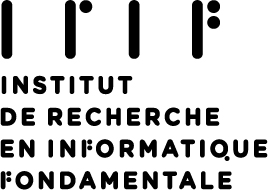Scientific Committee
Comité scientifique
Raphaëlle Crubillé (CNRS, Aix-Marseille Université)
Thomas Ehrhard (CNRS, Université Paris Cité)
Andrew D. Gordon (Cogna London)
Alexandra Silva (Cornell University)
Hongseok Yang (KAIST)
Organizing Commitee
Comité d’organisation
Guillaume Baudart (Inria Paris)
Michele Pagani (ENS Lyon)
Daniela Petrisan (Université Paris Cité)
Christine Tasson (Sorbonne Université)

IMPORTANT WARNING: Scam / Phishing / SMiShing ! Note that ill-intentioned people may be trying to contact some of participants by email or phone to get money and personal details, by pretending to be part of the staff of our conference center (CIRM). CIRM and the organizers will NEVER contact you by phone on this issue and will NEVER ask you to pay for accommodation/ board / possible registration fee in advance. Any due payment will be taken onsite at CIRM during your stay.
EPIT, the French spring school in theoretical computer science – was established in 1973 by Maurice Nivat. For 50 years, it has offered an annual intensive training program (approximately 5 days long) focused on a specific topic in theoretical computer science. This spring school is designed to introduce PhD students, early-career researchers (and also more senior scientists interested in exploring new domains) to a particular area of computer science. Links to some recent editions of EPIT can be found at https://epit.irif.fr/. Notably, the 2019, 2021, and 2022 EPIT editions were held at the CIRM.
The topic of the 2026 edition is probabilistic programming. Probabilistic programming is a paradigm that has experienced significant growth in recent years. Numerous probabilistic programming languages have been developed: WebPPL, Anglican, Stan, Gen.jl, Pyro, PyMC, … These languages are now used in fields ranging from computer vision (image generation) and robotics (planning), to health (epidemiology) and social sciences (surveys). Probabilistic programming is a very active field with academic groups in major universities. Popular probabilistic languages like Stan, Pyro, or PyMC have a significant user base across many fields and active development teams. Probabilistic languages are also developed by major companies and startups. Compared to classic programming languages, the design and implementation of a probabilistic language with automatic Bayesian inference raises many original questions at the intersection of formal semantics, typing, compilation, statistics, and machine learning.
L’EPIT, l’école de printemps française en informatique théorique, a été fondée en 1973 par Maurice Nivat. Depuis 50 ans, elle propose un programme de formation intensive annuel (d’une durée d’environ 5 jours) centré sur un sujet précis en informatique théorique. Cette école de printemps est conçue pour initier des doctorants, des jeunes chercheurs (et aussi des scientifiques plus aguerris qui voudraient explorer de nouveaux domaines) à un domaine particulier de l’informatique. Des liens vers quelques éditions récentes de l’EPIT sont disponibles sur https://epit.irif.fr/. Les éditions de l’EPIT en 2019, 2021, et 2022 ont eu lieu au CIRM.
Le sujet de l’édition 2026 est la programmation probabiliste. La programmation probabiliste est un paradigme qui a connu un essor significatif ces dernières années. De nombreux langages de programmation probabilistes ont été développés : WebPPL, Anglican, Stan, Gen.jl, Pyro, PyMC, … Ces langages sont désormais utilisés dans des domaines allant de la vision par ordinateur (génération d’images) et la robotique (planification), en passant par la santé (épidémiologie) et les sciences sociales (sondages). La programmation probabiliste est un domaine très actif avec des groupes de recherche dans les grandes universités. Les langages probabilistes populaires comme Stan, Pyro ou PyMC ont de nombreux utilisateurs issus de domaines divers et des équipes de développement actives. Des langages probabilistes sont également développés par de grandes entreprises et des startups. Comparée aux langages de programmation classiques, la conception et l’implémentation d’un langage probabiliste avec inférence bayésienne automatique soulèvent de nombreuses questions originales à l’intersection de la sémantique formelle, du typage, de la compilation, des statistiques et de l’apprentissage automatique.
COURSES
Raphaëlle Crubillé (CNRS, Aix-Marseille Université) Linear Logic and probabilistic programming
Stephen Holtzen (Northeastern University) Design and Implementation
Xavier Rival (Inria Paris, ENS Paris) Static Analysis
Sam Staton (University of Oxford) Semantics of probabilistic programs
Joseph Tassarotti (New York University) Formalization and verification of probabilistic programming languages
Christine Tasson (Sorbonne Université) Introduction / Background notion






